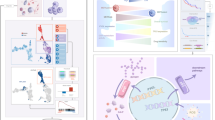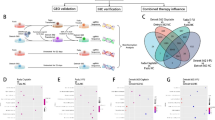Abstract
Purpose
Head and neck squamous cell carcinoma (HNSCC) is a common cancer with high mortality and poor prognosis partially owing to lack of application of predictive markers. Increasing evidence has suggested that metabolic dysregulation plays an important part in tumorigenesis. We aim to identify a prognostic metabolic pathway (MP) signature in HNSCC.
Methods
Single sample gene-set enrichment analysis (ssGSEA) was used in metabolic gene sets to develop a metabolism-based prognostic risk score (MPRS) for HNSCC using Cox regression analysis (univariate, LASSO, and stepwise multiple cox analysis), which was then validated in different subgroups, and association with clinical and mutational features was analyzed.
Results
Seventy-two dysregulated metabolic pathways were identified, and a six-MP signature (6MPS) was constructed which can effectively distinguish between the high- and low-risk patients in both training and testing sets, accompanied with high sensitivity and specificity (AUC = 0.7) in prognosis prediction. 6MPS was also applicable to patients of different subgroups. Furthermore, 6MPS is not only an independent prognostic predictor but also associated with clinicopathological and mutational features. Higher tumor stage and tumor mutation burden (TMB) have a higher MPRS.
Conclusion
6MPS functions not only as a promising predictor of prognosis and survival but also as potential marker for therapeutic schedule monitoring.




Similar content being viewed by others
Data availability statement
The TCGA-HNSCC data set that supports the findings of this study is available in [UCSC Xena] at [https://xenabrowser.net/datapages/] and [KEGG] at [https://www.genome.jp/kegg/pathway.html].
References
Aboud OA, Weiss RH (2013) New opportunities from the cancer metabolome. Clin Chem 59:138–146. https://doi.org/10.1373/clinchem.2012.184598
Ballman KV (2015) Biomarker: predictive or prognostic? J Clin Oncol 33:3968–3971. https://doi.org/10.1200/JCO.2015.63.3651
Buck A, Aichler M, Huber K, Walch A (2017) Situ metabolomics in cancer by mass spectrometry imaging. Adv Cancer Res 134:117–132. https://doi.org/10.1016/bs.acr.2016.11.004
Budach V, Tinhofer I (2019) Novel prognostic clinical factors and biomarkers for outcome prediction in head and neck cancer: a systematic review. Lancet Oncol 20:e313–e326. https://doi.org/10.1016/S1470-2045(19)30177-9
Cai Y, Dodhia S, Su GH (2017) Dysregulations in the PI3K pathway and targeted therapies for head and neck squamous cell carcinoma. Oncotarget 8: 22203–22217. https://doi.org/10.18632/oncotarget.14729.
Foroutan M, Bhuva DD, Lyu R, Horan K, Cursons J, Davis MJ (2018) Single sample scoring of molecular phenotypes. BMC Bioinform 19:404. https://doi.org/10.1186/s12859-018-2435-4
Guglas K et al (2017) lncRNA in HNSCC: challenges and potential. Contemp Oncol (Pozn) 21:259–266. https://doi.org/10.5114/wo.2017.72382
Guo W, Zhu L, Yu M, Zhu R, Chen Q, Wang Q (2018) A five-DNA methylation signature act as a novel prognostic biomarker in patients with ovarian serous cystadenocarcinoma. Clin Epigenet 10:142. https://doi.org/10.1186/s13148-018-0574-0
He Y, Ma J, Wang A, Wang W, Luo S, Liu Y, Ye X (2018) A support vector machine and a random forest classifier indicates a 15-miRNA set related to osteosarcoma recurrence. Onco Targets Ther 11:253–269. https://doi.org/10.2147/OTT.S148394
Li F et al (2013) Lipid profiling for early diagnosis and progression of colorectal cancer using direct-infusion electrospray ionization Fourier transform ion cyclotron resonance mass spectrometry. Rapid Commun Mass Spectrom 27:24–34. https://doi.org/10.1002/rcm.6420
Liu G et al (2018) A prognostic 5-lncRNA expression signature for head and neck squamous cell carcinoma. Sci Rep 8:15250. https://doi.org/10.1038/s41598-018-33642-1
Liu F, Xing L, Zhang X, Zhang X (2019) A Four-pseudogene classifier identified by machine learning serves as a novel prognostic marker for survival of osteosarcoma. Genes (Basel). https://doi.org/10.3390/genes10060414
Moskovitz JM, Moy J, Seiwert TY, Ferris RL (2017) Immunotherapy for head and neck squamous cell carcinoma: a review of current and emerging therapeutic options. Oncologist 22:680–693. https://doi.org/10.1634/theoncologist.2016-0318
Moy JD, Moskovitz JM, Ferris RL (2017) Biological mechanisms of immune escape and implications for immunotherapy in head and neck squamous cell carcinoma. Eur J Cancer 76:152–166. https://doi.org/10.1016/j.ejca.2016.12.035
Nonaka T, Wong DTW (2018) Liquid biopsy in head and neck cancer: promises and challenges. J Dent Res 97:701–708. https://doi.org/10.1177/0022034518762071
Pavlova NN, Thompson CB (2016) The emerging hallmarks of cancer metabolism. Cell Metab 23:27–47. https://doi.org/10.1016/j.cmet.2015.12.006
Quon H et al (2017) Quantitative evaluation of head and neck cancer treatment-related dysphagia in the development of a personalized treatment deintensification paradigm. Int J Radiat Oncol Biol Phys 99:1271–1278. https://doi.org/10.1016/j.ijrobp.2017.08.004
Rosario SR, Long MD, Affronti HC, Rowsam AM, Eng KH, Smiraglia DJ (2018) Pan-cancer analysis of transcriptional metabolic dysregulation using The Cancer Genome Atlas. Nat Commun 9:5330. https://doi.org/10.1038/s41467-018-07232-8
Shen S et al (2017a) A seven-gene prognostic signature for rapid determination of head and neck squamous cell carcinoma survival. Oncol Rep 38:3403–3411. https://doi.org/10.3892/or.2017.6057
Shen S et al (2017b) Seven-CpG-based prognostic signature coupled with gene expression predicts survival of oral squamous cell carcinoma. Clin Epigenet 9:88. https://doi.org/10.1186/s13148-017-0392-9
Shen S, Wang G, Zhang R, Zhao Y, Yu H, Wei Y, Chen F (2019) Development and validation of an immune gene-set based Prognostic signature in ovarian cancer. EBioMedicine 40:318–326. https://doi.org/10.1016/j.ebiom.2018.12.054
Siegel RL, Miller KD, Jemal A (2017) Cancer statistics. CA Cancer J Clin 67:7–30. https://doi.org/10.3322/caac.21387
Troiano G, Mastrangelo F, Caponio VCA, Laino L, Cirillo N, Lo Muzio L (2018) Predictive prognostic value of tissue-based microrna expression in oral squamous cell carcinoma: a systematic review and meta-analysis. J Dent Res 97:759–766. https://doi.org/10.1177/0022034518762090
Wang Q, Gao P, Wang X, Duan Y (2014) Investigation and identification of potential biomarkers in human saliva for the early diagnosis of oral squamous cell carcinoma. Clin Chim Acta 427:79–85. https://doi.org/10.1016/j.cca.2013.10.004
Wong N et al (2016) Prognostic microRNA signatures derived from The Cancer Genome Atlas for head and neck squamous cell carcinomas. Cancer Med 5:1619–1628. https://doi.org/10.1002/cam4.718
Xing L, Zhang X, Chen A (2019a) Prognostic 4-lncRNA-based risk model predicts survival time of patients with head and neck squamous cell carcinoma. Oncol Lett 18:3304–3316. https://doi.org/10.3892/ol.2019.10670
Xing L, Zhang X, Tong D (2019b) Systematic profile analysis of prognostic alternative messenger RNA splicing signatures and splicing factors in head and neck squamous cell carcinoma. DNA Cell Biol. https://doi.org/10.1089/dna.2019.4644
Xing L, Zhang X, Zhang X, Tong D (2020) Expression scoring of a small-nucleolar-RNA signature identified by machine learning serves as a prognostic predictor for head and neck cancer. J Cell Physiol. https://doi.org/10.1002/jcp.29462
Zhang F et al (2017) Metabolomics for biomarker discovery in the diagnosis, prognosis, survival and recurrence of colorectal cancer: a systematic review. Oncotarget 8: 35460–35472. https://doi.org/10.18632/oncotarget.16727
Zhang X, Feng H, Li D, Liu S, Amizuka N, Li M (2018a) Identification of differentially expressed genes induced by aberrant methylation in oral squamous cell carcinomas using integrated bioinformatic analysis. Int J Mol Sci. https://doi.org/10.3390/ijms19061698
Zhang X, Feng H, Li Z, Guo J, Li M (2018b) Aspirin is involved in the cell cycle arrest, apoptosis, cell migration, and invasion of oral squamous cell carcinoma. Int J Mol Sci. https://doi.org/10.3390/ijms19072029
Zhang X, Feng H, Li Z, Li D, Liu S, Huang H, Li M (2018c) Application of weighted gene co-expression network analysis to identify key modules and hub genes in oral squamous cell carcinoma tumorigenesis. Onco Targets Ther 11:6001–6021. https://doi.org/10.2147/OTT.S171791
Acknowledgements
We are grateful for the kind help of Dr. Xinhua Liu from Yantai Yuhuangding Hospital; Dr. Di Liu from School of Stomatology, Shandong University; and Professor Minqi Li from Department of bone metabolism of School of Stomatology, Shandong University.
Funding
This research received no external funding.
Author information
Authors and Affiliations
Contributions
Conceptualization, FL; data curation, FL; formal analysis, LX and MG; methodology, LX and MG; project administration, FL; software, XZ and XZ; validation, XZ and FL; visualization, XZ; writing—original draft, LX and XZ; writing—review and editing, FL.
Corresponding author
Ethics declarations
Conflict of interest
The authors declare that they have no conflict of interest.
Additional information
Publisher's Note
Springer Nature remains neutral with regard to jurisdictional claims in published maps and institutional affiliations.
Electronic supplementary material
Below is the link to the electronic supplementary material.
Rights and permissions
About this article
Cite this article
Xing, L., Guo, M., Zhang, X. et al. A transcriptional metabolic gene-set based prognostic signature is associated with clinical and mutational features in head and neck squamous cell carcinoma. J Cancer Res Clin Oncol 146, 621–630 (2020). https://doi.org/10.1007/s00432-020-03155-4
Received:
Accepted:
Published:
Issue Date:
DOI: https://doi.org/10.1007/s00432-020-03155-4




